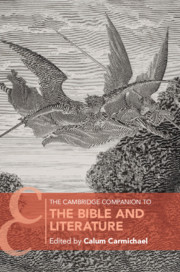Book contents
- The Cambridge Companion to the Bible and Literature
- Cambridge Companions to Religion
- The Cambridge Companion to the Bible and Literature
- Copyright page
- Contents
- Contributors
- Abbreviations
- Introduction
- 1 Literature in the Ancient Near East and the Bible
- 2 The Primary Narrative (Genesis through 2 Kings)
- 3 Reading Biblical Literature from a Legal and Political Perspective
- 4 Biblical Law and Literature
- 5 Kings, Prophets, and Judges
- 6 Prophetic Literature
- 7 Wisdom Literature
- 8 The Gospels
- 9 Paul’s Letters
- 10 Apocalyptic Literature
- 11 Shakespeare’s King Lear and the Bible
- 12 The Bible and John Milton’s Paradise Lost
- 13 The Bible, Shelley, and English Romanticism
- 14 Herman Melville and the Bible
- 15 The Song of Songs and Two Biblical Retellings
- Index
- Other Titles in the Series
- References
2 - The Primary Narrative (Genesis through 2 Kings)
Published online by Cambridge University Press: 13 March 2020
- The Cambridge Companion to the Bible and Literature
- Cambridge Companions to Religion
- The Cambridge Companion to the Bible and Literature
- Copyright page
- Contents
- Contributors
- Abbreviations
- Introduction
- 1 Literature in the Ancient Near East and the Bible
- 2 The Primary Narrative (Genesis through 2 Kings)
- 3 Reading Biblical Literature from a Legal and Political Perspective
- 4 Biblical Law and Literature
- 5 Kings, Prophets, and Judges
- 6 Prophetic Literature
- 7 Wisdom Literature
- 8 The Gospels
- 9 Paul’s Letters
- 10 Apocalyptic Literature
- 11 Shakespeare’s King Lear and the Bible
- 12 The Bible and John Milton’s Paradise Lost
- 13 The Bible, Shelley, and English Romanticism
- 14 Herman Melville and the Bible
- 15 The Song of Songs and Two Biblical Retellings
- Index
- Other Titles in the Series
- References
Summary
Genesis-Kings stands amid three key approaches to the Bible: quest for symbolic/allegorical meaning (Philo to Middle Ages); quest for factual history (Luther to ca. 1970s and “the collapse of history”); quest for literary artistry/meaning (esp. since James Muilenburg, 1968). Gen-Kgs emerges as a narrative with historical components, and triple focus: (i) human origins, (ii) Israel and Judah, a narrative matching that of other nations, and (iii) primarily a narrative of the human heart. Following literary convention, explicit emphasis on the heart occurs at the beginning (hearts estranged, Gen 6:5-6; 8:21), middle (listen with total heart, Deuteronomy, esp. 6:4-6), and end (Josiah’s total heart, 2 Kgs 23:25). Biblical accounts present diverse human dimensions, whether, for instance, God-like (Gen 1) or made of clay (Gen 2). Both are necessary. Abraham is more God-like than Jacob; Elijah more than Elisha. The first five books (Gen-Deut) build up towards the need to choose. The other books (Josh-Kgs) show pairs of contrasting choices: Joshua/Judges; Samuel/Saul; David/Solomon; prophets/kings; Hezekiah/Manasseh; Josiah/other kings.
Keywords
- Type
- Chapter
- Information
- The Cambridge Companion to the Bible and Literature , pp. 26 - 47Publisher: Cambridge University PressPrint publication year: 2020

